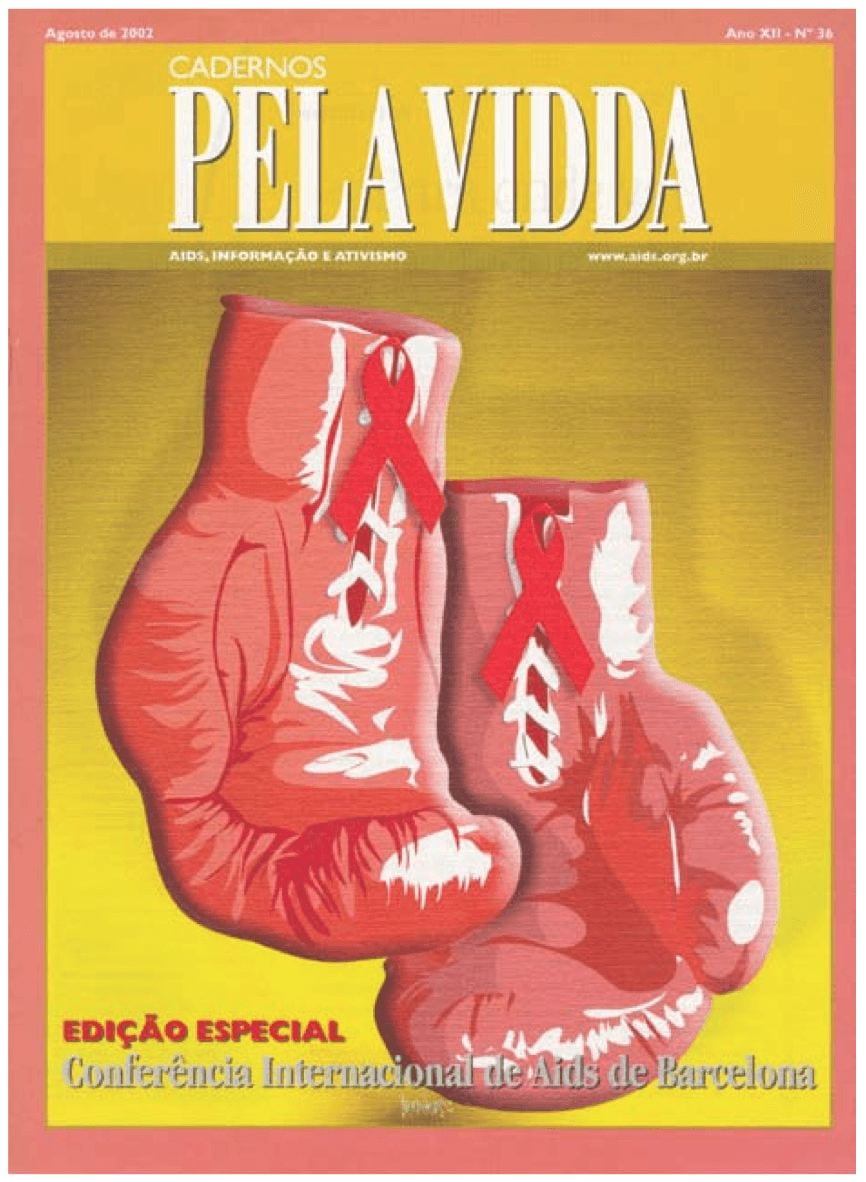The Brazilian Fight Against
Health and Rights in the World Market Economy
The dramatic beginnings of the AIDS epidemic in the 1980s were characterized by ignorance, fear and lack of solutions. Since the 1990s—the turn of the century—and in the new 00 decade, successful responses and hopeful scenarios for some, and a mix of stigma and inadequate responses for the majority, have marked the consolidation of the AIDS epidemic. During this time, we have become part of the Brazilian AIDS Social Movement, have made friends with many people living with HIV and AIDS, and have conducted research to obtain our graduate degrees.
Over time, it has become clearer to us that the AIDS epidemic represents different kinds of threats not limited to the need of preventing the spread of a rapidly growing epidemic, or of treating all those who live with the infection and need medical care. In addition to the challenges and threats to conservative cultural approaches around gender relationships, sexuality and power hierarchies in the medical setting, we want to concentrate in this essay on one of the biggest threats of the epidemic: how it impacts national and global markets.
Sick and dying citizens are in their most productive years, given that the epidemic mostly affects young adults. Moreover, countries’ cultural survival is in jeopardy because young adults are also the teachers responsible for educating children or the parents in charge of raising the new generations. A global economy scenario with a future generation of poorly educated producers and consumers who could migrate to more prosperous countries does seem like a “security concern” for world economic powers, as Bill Clinton put it when he was the U.S. president.
National and international responses to combat the AIDS epidemic have taken place within a growing influence of the for-profit pharmaceutical industry on foreign economic policies and treatises, which have amplified a neoliberal global economy. In this scenario of a global epidemic within an expanding neoliberal world economy, the Brazilian fight against AIDS is most significant. Brazil, ranked as a middle- income country, is in fact a powerful economy and an important player in the global economy scenario. This Latin American power for economic growth and regional integration has become a significant port in the global market. But, how does this economic placing of Brazil relate to the AIDS epidemic? What is the meaning of the successful Brazilian strategies to deal with the AIDS epidemic within a global neoliberal economy?
The International Monetary Fund (IMF), the International Development Bank (IDB) and the World Bank have become the reference points for third-world countries’ economies. These banks lend money to third word countries for social and developmental programs. However, accessing these loans has brought with it more economic dependency. A big portion of countries’ income is now dedicated to paying the very high interest rates of the loans—an important part of the rapidly escalating international debt. In addition, the World Bank’s growing focus on global health resulted in a situation in which countries, like most in Latin America, were required to implement market-based health care reforms in order to access credits. Many Latin American countries have also been obligated to sign trade agreements that favor a free-market approach to global health, including the patent protection of new and old drugs of the for-profit pharmaceutical companies. The results of more than a decade of neoliberal reforms and coercive international treatises on the AIDS epidemic are extremely high prices of the necessary AIDS medications (antiretrovirals—ARVs) and collapsing national economies that cannot purchase them.
Confronted with the duty to ensure very high profit margins for pharmaceutical companies with their newly discovered drugs for the treatment of AIDS and other diseases and the minimal purchasing capacity of the countries to afford these inflated prices, the World Bank faced a dilemma. Undoubtedly, it was not a moral but an economic dilemma. From the World Bank’s perspective, pharmaceuticals’ profits could not be endangered and at the same time third-world countries with their impoverished economies could not spend the majority of their income in purchasing drugs.
As a solution, the bank proposed that countries should only spend state resources in cost-effective strategies for the poor (in the AIDS situation this meant prevention campaigns) leaving expensive treatments that included AIDS therapies for individual purchasing within free markets. The moral dilemma, however, is that this free-market “sound” mentality represents a death row for the majority of the people living with AIDS, given that most cannot afford the life-saving medications. Over time, national and transnational NGOs, the other growing players of the global market economy, started to provide free-of-charge access to AIDS treatment in some local settings, creating a black market of AIDS medications. Dire poverty forces people to strategize means for survival and, for many people, AIDS is just another life threat but not the only or most significant one. Those who could afford medications but were afraid of the stigma would buy the medicines from those who would get the free medications from the NGOs but would rather have money for food or other basic needs.
Despite the World Bank’s recommended approach, which for many countries ended up in an imposition given their dependency on the banks’ credits, Brazil strongly opposed this approach. However, its alternative approach was fraught with obstacles, hesitations, or contradictions. It was not an easy process. Notwithstanding the difficulties, it is now fair to consider that Brazil was faithful to its tradition in social medicine and two of its principles: 1) Prevention and treatment should go hand in hand and cannot be thought as two separate approaches but rather as interconnected ones and 2) Health is a universal and integral human right and attempts to charge for health care represent access barriers and thus, a blatant human rights violation.
If health is a right for all and no condition (including payment capability) can exclude people from it, then it should be the state’s responsibility to provide it. In fact, the Brazilian 1988 constitution was not shy in declaring this right: “health is a right of all and the duty of the state.” This constitutional stand, now seen as progressive, is understandable only when looking at the history that gave rise to it. The constitution was enacted after more than twenty years of military dictatorship and was the result of a large social mobilization from different sectors, including health care workers and patients movements, who wanted a profound democratic transformation of the country.
Following these constitutional principles, the country organized its national health care system, Sistema Único de Saúde(SUS). During that same time, the first responses to the AIDS epidemic were taking place. The principles of the constitution were shared and used by AIDS activists (both people living with AIDS and non-infected citizens who have created groups and NGOs) to demand from the state free of charge distribution of ARVs, as well as all other needed medications and exams within the public health care networks of the country.
Even though AIDS activists are considered the main actors in these free of charge and public approach to AIDS treatment, social medicine scholars, journalists, celebrities, members of other social groups like feminists, sexual minorities, and labor groups, and even politicians were themselves part of the AIDS activist groups or shared the goals of the movement and became important players in the implementation of the Brazilian responses. The heterogeneous—and at many times conflicting—amalgam of actors and interests (some clearly advocating for a “health as a human rights” approach, and others thinking about strategies to show that cost-effectiveness did not conflict with peoples’ right to health) have largely agreed that AIDS care should include prevention and treatment in tandem and cannot be thought of as part of purchasable free-market merchandise. Even though the state needed to negotiate prices of brand and generic medications in the global market, people did not need to negotiate their health and right to live.
Over time, this Brazilian approach has proven to be not only morally right, but an unquestionable economic success. By integrating prevention with treatment, the country has avoided thousands of new infections, treatments of opportunistic infections and hospitalizations, and thus, saved millions of dollars in medical expenses. Moreover, people living with AIDS have increased their life span, living many more years plentifully. They have regained their vitality and many have been able to go back to work or avoid disability, families have been reunited and many more avoided fragmentations to disease or death. Children born with HIV, fewer every year, have been able to go to school and many, who have reached adulthood, have become productive citizens, fell in love, and started new families on their own.
Besides survival, a very significant aspect in the Brazilian history is that these successes have lead to a deep ethical debate in society aiding in the consolidation of democratic practices in the country. Very importantly, the successful responses have forced society to revisit gender, sexuality, age, race, and class inequalities, and to transform traditional hierarchies in medical settings in which a successful treatment no longer depends exclusively on the knowledge and expertise of the health care professional, but on how the health care and social support networks understand and accompany people in their treatments and life struggles.
In sum, the Brazilian strategy tells the world that people have the right to prevention strategies but that once infected, they also have the right to all necessary health care and to continue to be engaged in full and active lives like all citizens. In addition, a primary lesson is that the elimination of all inequalities, for example by not demanding the purchasing of medications or insurance policies which deepens class-based inequalities, is the cornerstone of a successful prevention and treatment approach.
In spite of the unquestionable Brazilian successes, proposals to expand this approach are timid when it comes to the global economy. On the one hand, many insist on prevention-only approaches—worse, some like Bush’s policies and some funding agencies, insist on abstinence-only messages. On the other hand, the most “advanced” members of international AIDS agencies have accepted that Brazil’s free of charge access to medications is a keystone to combat the epidemic, yet they have avoided challenging the free-market and for-profit agenda in global health. In a global market economy, the Brazilian approach teaches us that a good way to keep on thinking about health and human rights and their links to prosperity is to fight dogmas that place profits over people. This is nothing new, but international lending institutions mandate its forgetting.
Spring 2007, Volume VI, Number 3
César Ernesto Abadía-Barrero, DMD., DMSc.is an Associate Professor of Medical Anthropology at the Universidad Nacional de Colombia. He finished his doctorate studies at Harvard (2003), for which he wrote an Ethnography of Brazilian Children Living With And Affected by HIV and AIDS.
Mauro Brigeiro, MA.is an Associate Professor of Anthropology at the Universidad Nacional de Colombia. He earned his Masters degree on Collective Health at Social Medicine Institute of the Estate University of Rio de Janeiro in 2000. He has conducted studies on gender relations, sexuality and life cycles.
Related Articles
Violence Against Women in Brazil: Public Policy and its Implementation in Rural Areas
English + Português
Eight o’clock in the evening—it’s time to gather and watch the national news program in Rio de Janeiro, Brazil.
2022: Uma Encruzilhada Histórica
English + Português
Este segundo turno da eleição 2022 no Brasil é um embate histórico entre visões de mundo. Entre concepções de vida e seus sistemas de valores. Você vai eleger (etimologia: escolher) em que mundo seria concebível viver.
Editor’s Letter: Brazil
Brazil is different. Brazil is huge. Brazil is colorful. Brazil is magic. In Brazil, the people speak Portuguese instead of Spanish.





